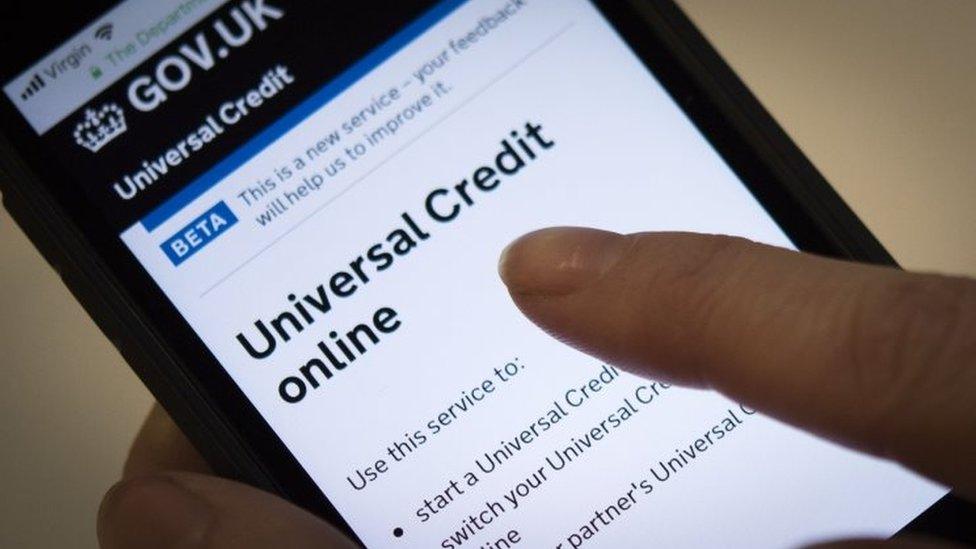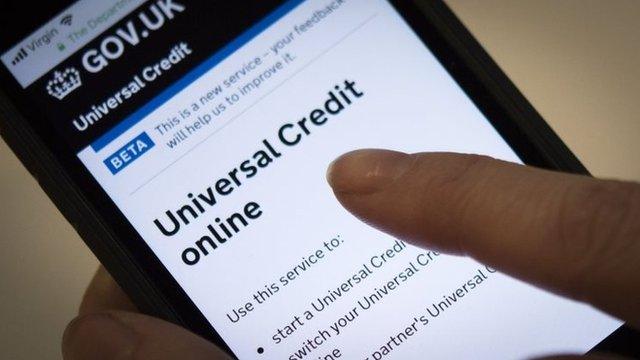Universal credit: People on tax credits 'to face issues'
- Published

People on tax credits are set to face "significant issues" when they are moved to universal credit, a Holyrood committee has said.
The group warned that there had been "less light" cast on how the shift from one system to another would work.
It also shared concerns about "punitive" conditions that could be put on the employed and said the switch should be halted.
The UK government said a majority were happy with universal credit.
Holyrood's social security committee shared its concerns in its latest report into in-work poverty, which has just been published.
'Remove sanctions'
It called for the UK government's benefits freeze to be lifted as MSPs say it is not realistic for the Scottish government to keep topping up welfare payments.
It also argued that those who receive tax credits should not be moved over to universal credit unless the threat of sanctions which could lower payments is removed.
However, the Department for Work and Pensions (DWP) claims people are moving into work faster and staying in work longer than under the old system and that universal credit remains on track to be fully rolled out by 2023.
Social security committee leader Bob Doris said: "There has been less light cast upon the proposed migration of working families who receive tax credits and how universal credit will impact them.
"The committee makes it clear we are opposed to attaching punitive conditions to those already in work.
"Unless the threat of sanctions and conditionality are removed, there is a case to be made for leaving those on tax credit support out of universal credit altogether and continuing to use HMRC."

How universal credit works for the employed
Depending on circumstances, some people will be able to earn a certain amount without it affecting their universal credit payments - the amount is called a work allowance.
For every £1 people earn above a work allowance, their universal credit payment will be reduced by 63p.
If people do not have a work allowance, this reduction applies to all earnings.
If someone earns enough to no longer receive universal credit, their claim will be paused automatically.
Bonuses can affect payments, potentially across several months.
Universal credit payments can be reduced depending on when pay days fall.
If a person does not receive universal credit for six months, their claim will stop entirely.
Source: Department for Work and Pensions

The committee said there was a case to be made to review local access to the DWP to allow for more support in their community, in place of a digital system.
Concerns were also raised about the strains universal credit placed on "over-stretched" JobCentre staff amid closures.
Mr Doris continued: "There appears to be no realistic way that a supportive or person-centred approach could be offered to everyone despite the best intentions of many employees.
"However, there could be opportunities to offer a more personalised, local employment support in communities by working closely with other agencies on the ground. The DWP must therefore review local access to jobcentres.
"We acknowledge some much-needed changes were made last year to universal credit. However, it remains simply unacceptable that vulnerable claimants still must wait at least five weeks before getting benefits they are entitled to.
"The committee is also keen for the significant damaging cuts made in the 2015 UK Budget to be reversed and the benefits freeze to be immediately lifted. "
A DWP spokesman said: "Latest figures show four out of five universal credit claimants are satisfied with their experience, with 96% of payments made in full and on time.
"The UK government continues to spend around £90bn a year to support low-income families, meanwhile, Scotland has significant welfare powers, including to top-up existing benefits, pay discretionary payments and create entirely new benefits altogether."
- Published6 December 2018

- Published28 November 2018

- Published13 May 2024
